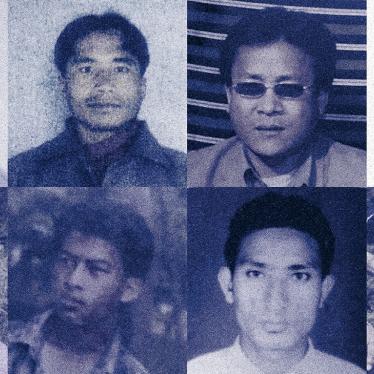Life in Thailand is growing more absurd by the day. Earlier this week Gen. Prayuth Chan-Ocha, the leader of the junta that seized power in May and later anointed himself prime minister, was beginning a speech in the northeastern province of Khon Kaen when five local university students stood up and stripped down to t-shirts emblazoned with “Don’t Want a Coup” in Thai. They then raised their hands to give the iconic three-fingered salute of Jennifer Lawrence’s heroine in “The Hunger Games” franchise, a symbol of resistance in Thailand since the coup.
“I want to express my opinion and I’m from here,” one said, as security forces surrounded him and the other students. Security forces seized the students and led them away.
The entire episode was captured on video. A short while after the students were taken off, General Prayuth dropped a chilling challenge with a smile: “Anyone else want to protest?”
It was hardly a laughing matter for the students. Security personal took them to a nearby military base in Khon Kaen to be interrogated by an intelligence unit. There, officers told local rights advocates that the five would be charged with violating martial law and have to sign an agreement not to engage in further political activity. The intelligence officers threatened the students with expulsion from the university and worse. But the students refused to back down—even at one point singing a Thai version of the “Les Miserables” anthem “Do You Hear the People Sing?” which led one intelligence officer to order soldiers to strip off their anti-coup t-shirts.
The military is expected to charge the five with violating martial law and order school officials to expel them from Khon Kaen University.
“The Hunger Games” movies take place in a dystopian totalitarian society in the future, divided into districts outside a wealthy capital. The heroine, Katniss Everdeen, comes from District 12. Last week, outside the latest film’s premier in London, a group of anti-coup protesters held up a sign reading “District Thai.”
When news of the arrests reached Bangkok on Wednesday, several student activists gathered at the city’s Democracy Monument to support the students and were briefly detained. Others assembled at cinemas showing “The Hunger Games” and flashed the three-fingered salute. At least one cinema group with two theaters in Bangkok then announced that it had decided not to show the film “for fear of political implications.” On Thursday, the authorities arrested at least three students outside a cinema where the movie was set to be shown.
Such is life in Thailand under martial law. Bangkok’s hustle and bustle remains—tourists, shops, commuters—but protests and political gatherings are illegal. Unauthorized meetings with more than five people are banned, and violators risk trial in military courts where decisions are final and there is no appeal.
Since the coup, which the junta contends was necessary to restore order after months of political protests, dissidents have sought novel ways to protest military rule, including the three-finger salute, eating sandwiches together in “democracy picnics,” or publicly reading George Orwell’s “1984.”
In the wake of the coup, media outlets in Thailand remain tightly restricted. One Thai military official recently told editors: “We don’t limit media freedom but freedom must be within limits.”
It is time for the international community to see Thailand’s leadership for what it is: a military dictatorship set on long-term rule. Of course, Thailand has suffered a number of coups over its modern history. Some of the coups, during the Cold War, led to authoritarian governments that ruled for years. But more recent military coups in 1991 and 2006 were short-lived “resets,” with elections scheduled relatively soon after. The current military rule, however, appears more of the old school. All evidence suggests the military’s so-called roadmap to democracy, sketched out in mid-2014, is really a roadmap to nowhere—the junta no longer even bothers to pretend that elections will be held next year.
Thailand’s friends and allies need to adopt a tougher line with the junta, and insist on a speedier timeline to democratic civilian rule. In the interim, they should press the junta to lift its restrictions on free speech and assembly.
And someone needs to inform General Prayuth that if his system of government is threatened by young people emulating a Hollywood movie, it is pretty sure sign that things needs to change.
John Sifton is Asia advocacy director at Human Rights Watch. Follow him on Twitter @JohnSifton.








